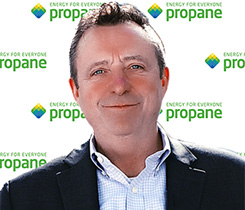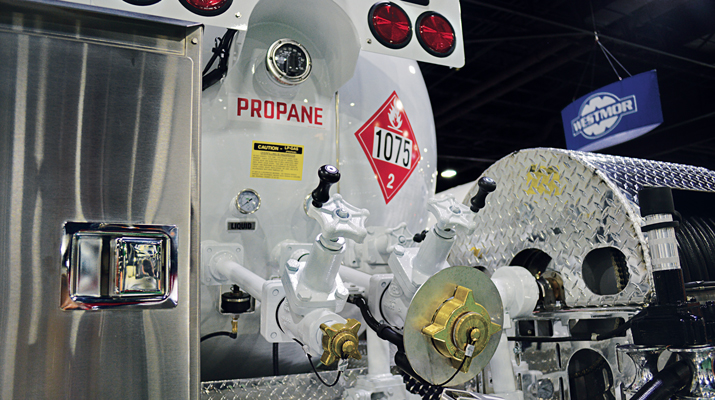Industry to invest $6 million to ramp up green energy message
The Propane Education & Research Council (PERC) will spend more than $6 million in the second half of 2009 to make the industry’s voice heard amid growing nationwide clamor about the economy, energy and global climate change.
President Barack Obama and a supportive Congress are promising historic changes to the paradigm of how America heats its homes, fuels its businesses and powers its vehicles. Their energy and environmental policy decisions and the resulting regulations will play a major role in either promoting or inhibiting the use of specific fuels in various markets.
Industry officials think propane can benefit from the nationwide debate among opinion leaders, citizens, politicians and energy and environmental experts. It has been conspicuously absent as stakeholders discuss sweeping reforms, however, and there is concern about missing out on landmark changes without a louder voice in the discussion.
“If we are not part of this conversation then we may very well lose market share to up-and-coming alternative fuels,” said Joseph Armentano, president of Paraco Gas and chairman of an industry task force guiding a new nationwide marketing campaign scheduled to launch in June.
Dubbed the National Energy Conversation (NEC), the initiative will use online/print/TV advertising, Web site, public relations and public education efforts to clarify and amplify the industry’s case that propane is a vital component to the nation’s future energy portfolio. PERC last month approved $6.2 million for the campaign in 2009 and will likely be asked for more next year and perhaps in 2011.
Propane stacks up well as a reliable domestic energy that offers advantages over other fuels, including low emissions, cost competitiveness, ease of use and a reputation for reliability and safety. It has extensive distribution infrastructure in place and offers a host of timely new technologies and products from recent research and development efforts.
However, many of its market opportunities are driven or impacted by regulatory and policy initiatives that hang in the balance of the national debate.
“I think we have many opportunities to position propane as a solution that is available today. For that message, it is impossible to have a bullhorn that is too big,” said National Propane Gas Association President Richard Roldan.
“The question is how to position ourselves as an industry to get immediate market share from fuel oil and continue to increase our share when the housing market eventually comes back,” adds Armentano. “I really think that as alternative fuel we are positioned well. But we also need to look at future trends and see how, in the next five years, propane can also become renewable because that is the real long-term goal of [President Obama’s] administration.”
Message on the table
Advocates for every type of energy resource – wind, solar, oil, natural gas, ethanol, coal, biofuels and electricity – already are stepping up to shape public perceptions with well-funded campaigns to stake their position and tell their story. Propane industry leaders think a strategic, timely public relations and advertising blitz could capitalize on those efforts as well as the public frenzy surrounding policy changes that promise to clean the air, foster domestic independence and create jobs in a dismal economy.
PERC’s new marketing communications partner, Collie+McVoy, is working with an industry task force and the PERC staff to create and implement a campaign aimed at propane end users, prospects and opinion leaders. According to the funding request, the campaign intends to create an umbrella “clean reliable energy now” message that benefits the entire propane industry and complements PERC’s specific market development plans.
“Those of us in the industry recognize that propane has a natural advantage as a low-carbon fuel. But that information is also vital to private individuals, corporate and community leaders, and municipal, state and federal officials who make energy decisions and shape markets, who may not know much about propane. The purpose of the NEC campaign is to get that message out so that propane is recognized favorably across these multiple audiences for the contribution it can make – immediately – toward reducing greenhouse gas emissions and achieving the nation’s energy and economic objectives,” it says.
Specific campaign objectives are:
• Promote propane’s role as a vital alternative energy option as the country looks to minimize environmental impact and increase our energy independence and fuel efficiencies.
• Educate opinion leaders that propane is a progressive energy (with environmental, efficient and economic benefits) that is solving diverse energy needs today.
• Support other PERC and industry efforts to create continued and future demand for propane by promoting the benefits gained from its use.
Campaign officials say it’s vital for those on the front lines of the industry to promote the campaign message at the state and local level. State executives and marketers will be prodded to use PERC state rebate and matching funds for print ads, news releases, online banners, radio and TV spots and collateral materials that can be customized with local contact information. A webinar also will be offered to highlight the materials and explain how to use them locally.
SIDEBAR
The Obama plan
President Obama’s evolving economic and energy plan is centered on cutting emissions of greenhouse gases (carbon dioxide, ethane, nitrous oxide and fluorinated gases) to fight global warming. Carbon dioxide accounts for the largest share of those emissions in the United States, largely due to the burning of fossil fuels.
In the president’s February address to a joint session of Congress, he pushed for a mandatory cap on greenhouse gas emissions, saying it would help initiate economic recovery by “giving U.S. companies greater incentive to start producing more wind turbines, solar panels, biofuels and battery-powered automobiles.”
The cap-and-trade program being discussed would track emissions and factor their cost into economic decisions. Efficiency and performance standards, incentives for the purchase of advanced technology, and funding for research, development and deployment of technology also would factor into tax policy.
National Propane Gas Association President Richard Roldan says the carbon regulation initiative is the largest in 20 years. “The last time we saw all this political machinery with its gears cranking at the same time to turn out legislation that is this far-reaching and comprehensive was the Clean Air Act of 1990,” he said. “This is huge.”
Obama’s cap-and-trade program would tax greenhouse gas polluters to generate $646 billion in new revenue between 2012-19, according to the 2010 budget request submitted to Congress Feb. 26. Yet to be determined is where along the energy distribution chain those regulations will be applied.
Setting the point of regulation (the parties responsible for tracking emissions and turning in allowances) is different in a cap-and-trade program. Traditionally, the regulated entity is the source that emits the pollution because it is capable of installing controls to reduce its emissions. The point of regulation in a new program could be set at one of various points along the stream of economic activity that results in emissions.
If the point of regulation for carbon dioxide emissions from fossil fuel combustion were placed upstream or midstream with fuel producers, processors or providers, the program could have broader coverage of the emissions. That approach would require fuel producers, processors or providers to turn in allowances to cover the carbon content of the fuel ultimately combusted by end users.
“Congressional programs of this magnitude always create great winners and losers. I have yet to see a landmark piece of legislation that hasn’t had a slew of unintended consequences,” warns Roldan, who says the Obama plan will increase the cost of all forms of energy.
“The big goal for us is to make sure marketers are not the point of enforcement. Keep in mind that there are a lot of well-funded, deep interests in Washington whose sole goal right now is to make sure they are not the point of regulation. If we are asleep at the wheel, our industry could end up bearing a disproportionate share of the cost burden.”















